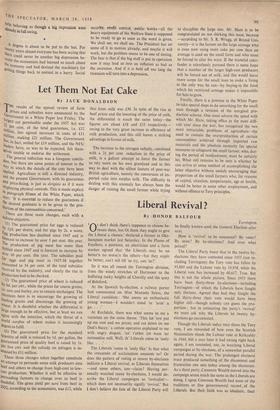Let Them. Not Eat Cake
By JACK DONALDSON T. prices and subsidies were announced by the vernment w in a White Paper last Friday. The 2rgest cut permissible under the 1957 Act wasf . per cent. of the total guarantees, i.e. £32 m'ilin, less agreed increases in costs of £11 million, making £21 million. The Government has, in fact, settled for £19 million, and the NFU leaders have, as was to be expected, felt them- selves unable to endorse the settlement.
The general reduction was a foregone conclu- sion, but there are some points of interest in the waY in which. the details of the cuts have been applied. Agriculture is still a directed industry, and the present Government, with its guarantees and price-fixing, is just as dirigiste as if it were employing physical controls. This is made explicit 'n Paragraph fifteen of the White Paper, which says : 'It is essential to reduce the guarantees if the desired guidance is to be given to the pro- duction of the commodities concerned.'
There are three main changes, each with a definite objective.
,, (1) The guaranteed price for eggs is reduced .,,'Y lid. per dozen, and for pigs by 2s. a score. Egg production has doubled since 1947 and is forecast to increase by over 5 per cent. this year. The production of pig meat has more than trebled since 1947 and is forecast to increase by over 10 per cent. this year. The subsidies paid for eggs and pig meat in 1957-58 together amounted to 34 per cent. of the total subsidies received by the industry, and clearly the rise in Production had to be checked.
, • (2) The guaranteed price of wheat is reduced ?I' 6d. per cwt., while the prices for coarse grains, 14. oats and barley, are to remain unchanged. The intention here is to encourage the growing of feeding grains and discourage the growing of wheat. It is doubtful whether the differential is large enough to be effective, but at least we can agree with the intention, which the threat of a World surplus of wheat makes it increasingly urgent to fulfil.
(3) The guaranteed price for the standard quantity of milk is reduced by -1d. per gallon, the guaranteed price of quality beef is raised by Is. Per live cwt. and the subsidy. on nitrogen is in- creased by £11 million.
These three changes taken together constitute an attempt to persuade some milk producers into beef and others to change from high-cost to low- cost production. Whether it will be effective in Persuading farmers to change over to beef is doubtful. The gross yield per acre from beef in 1952, according to the economists, was £15, while that from milk was £30. In spite of the rise in beef prices and the lowering of the price of milk, the differential is much the same today—the figures are about £18 and £33 respectively— owing to the very great increase in efficiency of milk production, and this still leaves a striking advantage in favour of milk.
The increase in the nitrogen subsidy, combined with a 2-1- per cent. reduction in the price of milk, is a gallant attempt to force the farmer to rely more on his own grassland and in this way to deal with, the silliest feature of post-war British agriculture, namely the conversion of im- ported cake into surplus milk. The difficulty in dealing with this anomaly has always been the danger of ruining the small farmer while trying to discipline the large one. Mr. Hare is to be congratulated on not shirking this issue, because —according to Mr. S. R. Wragg, of Bristol Uni- versity—it is the farmer on fhe large acreage who is even now using more cake per cow than on average is used on the small farm and who must be forced to alter his ways. If the wasteful cake- feeder is relentlessly pursued there is some hope that a number of the larger high-cost producers will be forced out of milk, and this would leave more scope for the small man to make a living in the only way he can—by buying-in the food which his restricted acreage makes it impossible for him to grow.
Finally, there is a promise in the White Paper to take special steps to do something for the small man through a revision of the marginal pro- duction scheme. One must admire the speed with which Mr. Hare, taking office in the most diffi- cult year since the war, has recognised the two most intractable problems of agriculture—the need to contain the overproduction of certain commodities achieved through imported raw materials and the absolute necessity for special measures to safeguard the small farmer, who, dur- ing the period of readjustment, must be unfairly hit. What still remains to be seen is whether he can arrive at some method of accomplishing the latter objective without unduly encouraging that proportion of the small farmers who, for reasons of capital, situation, temperament, age or health, would be better in some other employment, and without offence to Tory principles.










































 Previous page
Previous page